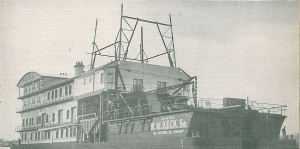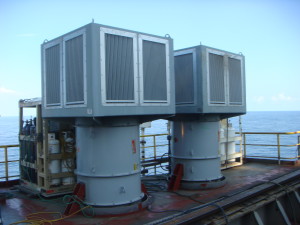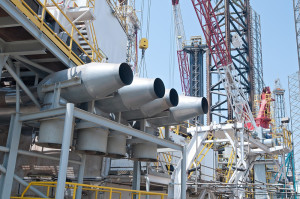In the early 50’s, oil companies began exploring in the Gulf of Mexico with submersible drilling barges. When Superior Oil Company commissioned the Levingston Shipbuilding Yard to build its then state-of-the-art “W.M. Keck Sr.”, Eldridge designed the ventilation system and supplied the fans. From that point on, Eldridge has pioneered new methods and products for marine ventilation systems on mobile offshore drilling units (MODU) that have become industry standards. Here are a few of the innovations that Eldridge has contributed.

Explosion Proof Fans
A MODU is a very dangerous place to work where fire danger is a constant threat. That is why all motors used in marine duty fans located in hazardous areas must be explosion proof. But it was Eldridge that realized the motor is not the only potential source for a spark in a fan. To eliminate the potential for a spark, Eldridge started supplying their marine duty fans with aluminum propellers and then later with aluminum rub rings. Eldridge then worked with the American Bureau of Shipping to make the aluminum propeller and rub ring a standard for any explosion proof marine duty fan.
Fume Extraction Systems
Shale shakers and muds pits on a MODU are used to clean and store drilling mud. When the drilling mud is exposed to air, it gives off dangerous and flammable gases. Eldridge realized that the build-up of these fumes in the confines of a MODU were a health risk and a potential fire hazard. Eldridge designed the first specialized shale shaker and mud pit fume extraction systems that would capture the fumes before they could escape into the general ventilation system and safely vent them to the outside.
Storm Guard Hoods
Every MODU ventilation system must have an air supply source. Because MODUs operate in extreme weather conditions, their air supply sources must be protected from rain and wind driven water. Eldridge designed its patented Storm Guard Hood to allow zero water penetration in the worst weather conditions. The Storm Guard Hood has been proven in testing to be able to withstand 14” rainfall per hour without any water penetration.
Dehumidification
When a MODU is not expected to be on contract for an extended period of time, the vessel owner will “stack” it to minimize operating costs. What vessel operators discovered was that the condition of rotating equipment, electronics and crew quarters significantly deteriorated during the stack time because of humidity. Eldridge used its extensive experience in creating low humidity environments for other industries to design a dehumidification system for stacked MODUs. The Eldridge dehumidification system has saved vessel owners millions of dollars in replacement equipment and has hastened the time to return a MODU to working order when it is time to go back to work.
Enjets
Working above deck on a MODU has its own unique set of hazards and risks. One of those risks is exposure to noxious fumes and residue from engine generators that provide power to the MODU. When the US Coast Guard would not let a MODU start to work because of this engine exhaust blow back problem, Eldridge came to the customer’s rescue with the invention of its now patented Enjet product that diffuses and directs engine exhaust away from equipment and people. Enjets are now used on MODUs around the world to make working conditions above deck safer and cleaner.
Conclusion
Due to Eldridge’s reputation for leading the way in the evolution of marine ventilation systems for MODUs, by the year 2010, over 70% of the active world fleet of MODUs were utilizing Eldridge designs and equipment. No other firm has the depth and breadth of marine ventilation system experience. That is why only Eldridge will say that we guarantee that our marine ventilation system design and specified products will provide the required air flow to keep equipment and people operating safely and efficiently.


